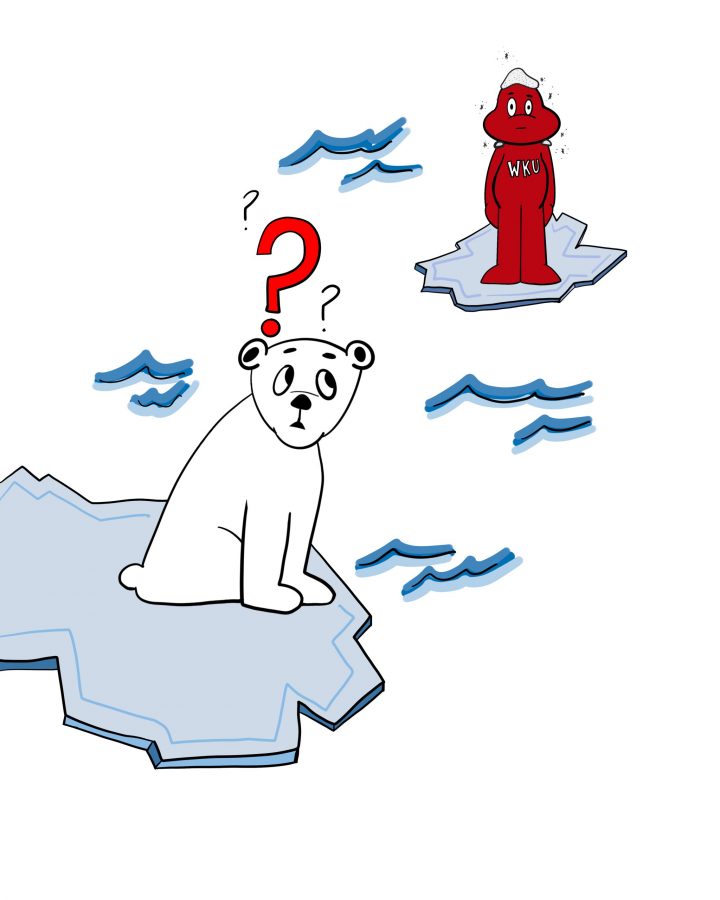OPINION: Why college students should care about climate change
November 4, 2021
Climate change. It’s an issue that is heard all over the news, yet not everyone understands its gravity. It’s a polarizing topic on which no one can agree. There are varying degrees of care about the issue, but it’s college-aged people that need to care the most.
To care about climate change, one first needs to understand it. I sat down with Pat Kambesis, a professor in WKU’s Environmental Science department, to further my own understanding of the issue.
I began by asking Kambesis the main causes of climate change. She told me that the biggest factor was carbon emission. In her words, climate change is “the greenhouse effect on steroids.” According to NASA, gases like carbon dioxide, nitrous oxide and methane are being released into the air at higher rates than ever, causing heat from sunlight to stay in the atmosphere after the reflection of the Earth’s surface.
There are countless ways these greenhouse gases are being released into the air. The burning of fossil fuels in manufacturing, vehicle use and the production of electricity are just a few ways this is happening.
When I asked Kambesis about some of the effects of climate change, she told me that climate change “is not going to make new things happen. It’s just going to exacerbate what is already happening.” Sea levels will rise, impacting coastal cities. Climate systems like the jetstream will change, causing weather patterns to change as well. These changing patterns cause catastrophes such as more powerful storm systems or the faster spread and larger size of wildfires.
The National Resources Defense Council outlines even more effects, like health effects on humans, changing ecosystems and an air quality that can be harmful to the people of the world.
For years, lawmakers in the United States and around the globe have attempted to take action on climate change. However, no one can agree on the best way to combat it. The allocation of funds is the biggest issue preventing action in the United States. In the words of Kambesis, however, “it’s the collective that will make the difference.”
Young people like myself must begin to care about climate change in a way that has never been done before. If this generation wishes to have a safe and secure future unimpeded by the impacts of climate change, it must stake its claim in the issue.
Young people must realize that their future will be determined by the action that is taken on climate change in the very near future. Currently, world leaders are meeting in Glasgow, Scotland at the COP26 conference, working to take large, collective action on the issue.
College-aged people will be the ones to hold the governments of the world accountable for whatever is agreed upon in the coming weeks. One two-week-long conference is nowhere near enough action on the issue, but it is a start.
The younger generations must take action in order to realize the future that is needed. The election of the lawmakers who believe in the necessary work that needs to be done is the easiest thing for this group of people to do. In electing these individuals, it is more likely that concrete, measurable action will be taken.
Pressure must be put on those currently in power to take change. Those in power must realize that this generation wants to have a future that is ensured to be safe for generations to come. The constant threat of no return must not loom over the heads of all citizens of the world.
You may ask, what about those who don’t believe in climate change? To these people, I pose a question in response; what is wrong with a healthier, cleaner planet for all? If climate change does not pose a threat, would society not benefit from a world in which the air quality is safer, temperatures are more manageable and coastal cities are not on the precipice of permanent change?
It’s common sense to me that the world must take collective action to prevent climate change from destroying our way of life.
The future is not bleak, however. Kambesis told me that in one way or another, we talk about climate change in most environmental science classes at WKU. Kambesis has noticed that the students in these classes are not detached from the issue. They realize that it is an issue that must be faced head-on. The students seem to care, and “that’s what will make the difference.”
Students are already realizing that climate change does not have to be something that must be lived with. Instead, they realize that the world is ready for a change. If WKU’s students represent a trend at all colleges and universities in the nation, we have reason to hope.
People my age struggle with grasping and caring about the issue, but learning about it and truly embracing it will allow the world to become a safer place for our children and their children. A future where we do not have to worry is one worth fighting for.
Commentary writer Price Wilborn can be reached at [email protected]. Follow him on Twitter @pricewilborn.













